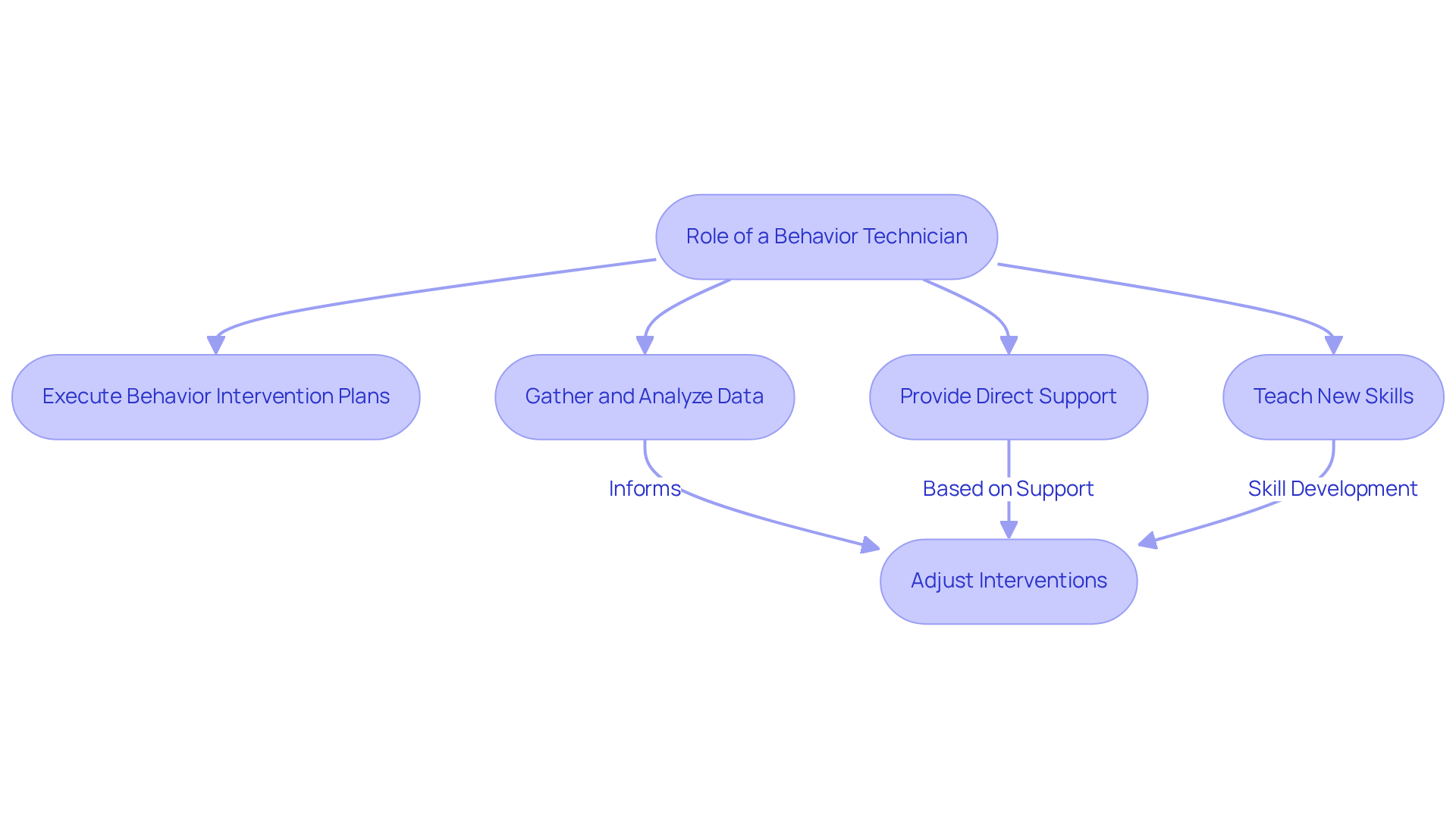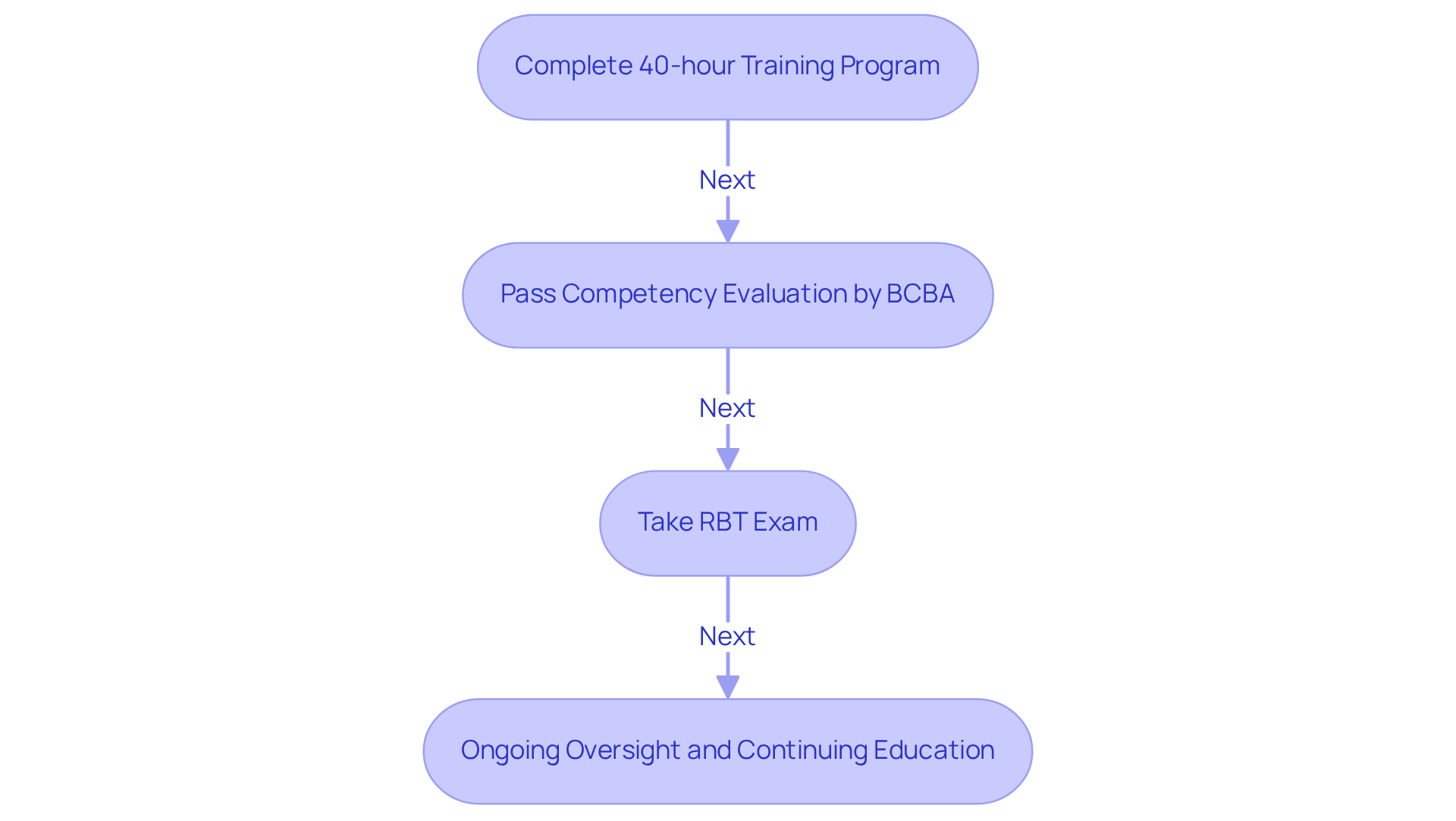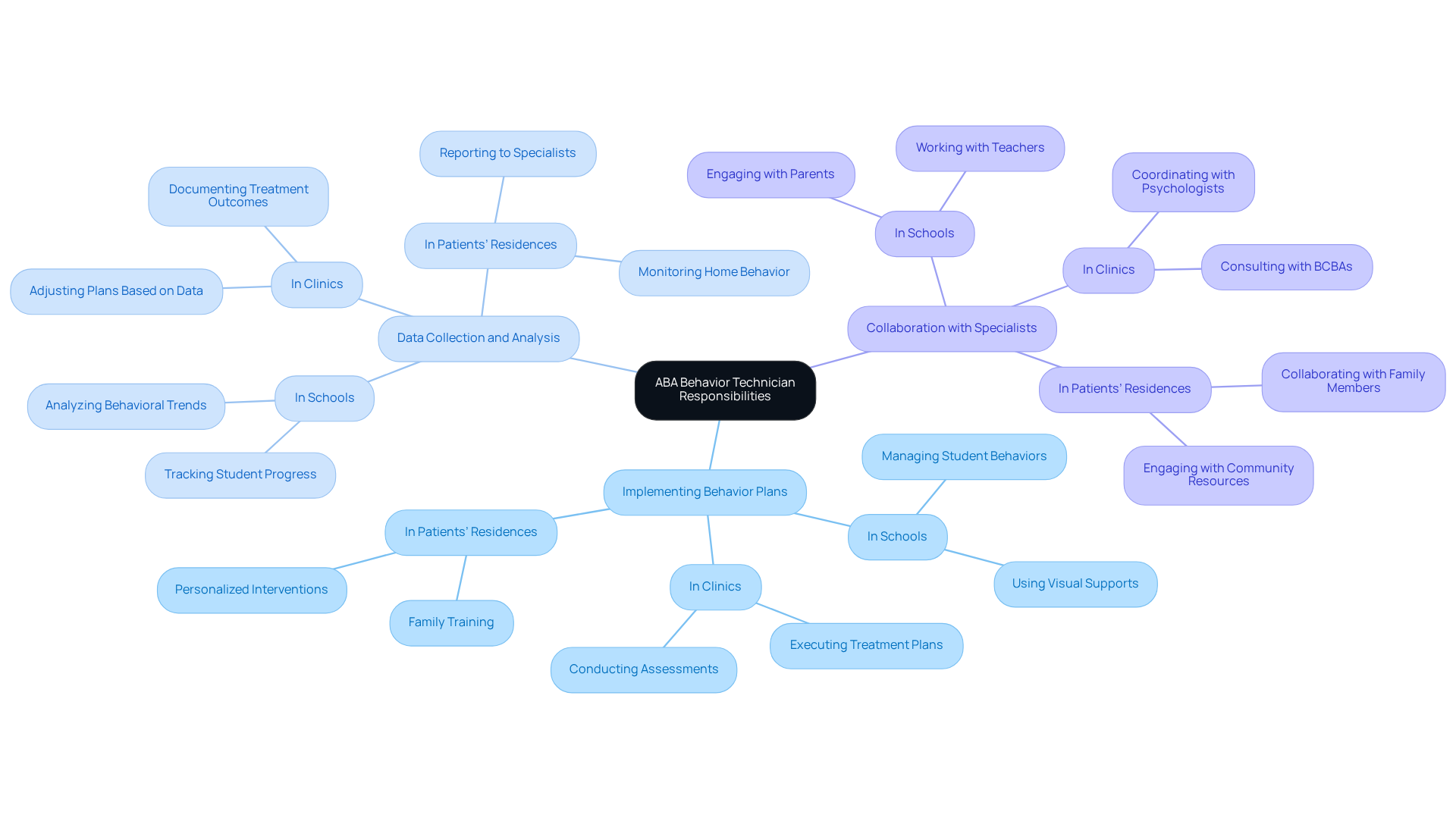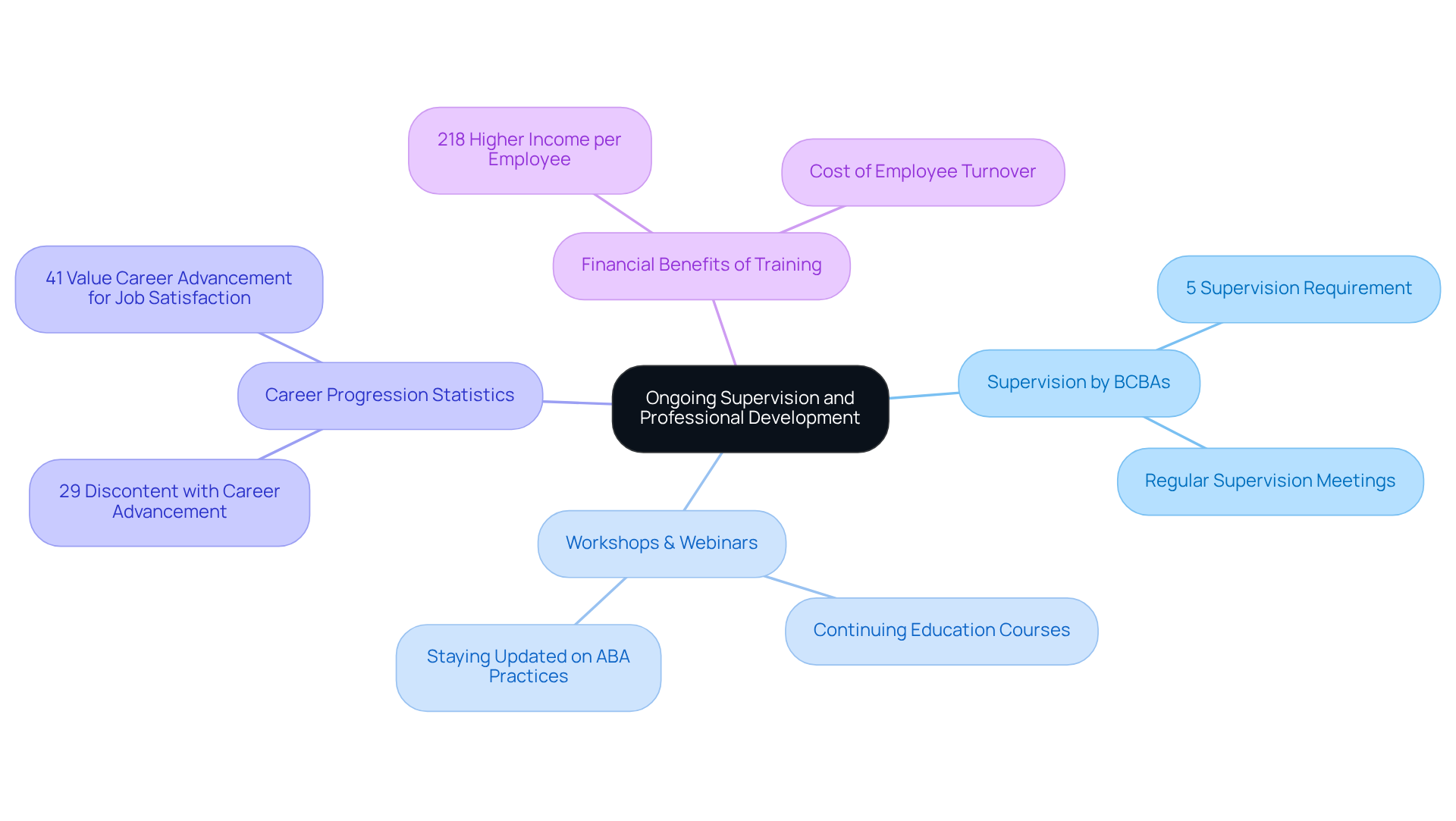June 30, 2025

To become an ABA behavior technician, individuals must complete a 40-hour training program, pass a competency evaluation, and successfully take the RBT exam. This process is followed by ongoing professional development and supervision. These steps are essential, as behavior technicians play a vital role in:
Their contributions significantly impact treatment outcomes for individuals with autism and developmental disorders. As the demand for qualified professionals in this field continues to rise, understanding these requirements is crucial for those looking to make a difference.
The escalating demand for skilled professionals in Applied Behavior Analysis (ABA) underscores the essential role of Behavior Technicians in aiding individuals with autism and other developmental disorders. These technicians execute intervention plans, gather crucial data, and cultivate meaningful relationships, significantly impacting therapy outcomes.
Aspiring Behavior Technicians may ponder: what are the critical steps to embark on this fulfilling career, and how can they ensure they possess the requisite skills and training to thrive?
This guide delineates the pathway to becoming a certified ABA Behavior Technician, offering insights into:
A Technician specialized in actions, often referred to as a Registered Technician (RBT), plays a crucial role in the success of Applied Behavior Analysis (ABA) therapy. With over 100,000 Registered Technicians employed across the United States, the demand for skilled professionals in this field is on the rise. These experts are responsible for:
Under the guidance of Board Certified Analysts (BCBAs), RBTs create a positive learning environment that fosters growth and development.
The responsibilities of Behavior Technicians extend beyond mere execution; they actively teach new skills, address challenging behaviors, and apply reinforcement strategies to facilitate progress. Their daily interactions with clients significantly impact therapy outcomes, as they cultivate meaningful relationships that build trust and enhance engagement. As noted by Golden Steps ABA, "ABA behavior technicians collaborate closely with BCBAs, caregivers, and other specialists involved in autism treatment," highlighting their essential role in effective therapy. RBTs possess the ability to make real-time adjustments during sessions based on client responses, thereby optimizing the effectiveness of interventions.
The commitment of ABA behavior technicians to personalized care profoundly influences the lives of individuals with autism and their families, making them indispensable members of the treatment team. As emphasized by All Star, "Support technicians are the backbone of any ABA therapy program, bringing essential skills and dedication that drive the success of interventions." Understanding these fundamental duties, including completing a and passing a competency evaluation, is vital for anyone considering a career as a Technician, as it underscores the significant impact they can have on clients' lives.

To obtain certification as an ABA behavior technician in this field, candidates must successfully complete a 40-hour training program that covers the fundamental principles of (ABA) and the specific duties associated with the role. This training is typically offered by BACB-approved organizations, effectively blending theoretical knowledge with practical skills essential for proficient practice.
Following the training, candidates are required to:
Maintaining certification as an ABA behavior technician necessitates ongoing oversight and continuing education, which are vital for ensuring that ABA behavior technicians remain well-informed about best practices and uphold ethical standards within the industry.
Significantly, the average salary for Registered Behavior Technicians (RBT) hovers around $36,763, and the demand for Board Certified Analysts (BCBAs) is projected to surge by 25% by 2026. This trend underscores the importance of certification in this expanding sector.
Furthermore, BACB-approved training has proven effective in preparing candidates for the challenges they will encounter in practice, with current pass rates for the RBT exam serving as critical indicators of the competency of potential hires.

ABA behavior technicians operate in diverse environments, including schools, clinics, and patients' residences. Their daily responsibilities as an ABA behavior technician may vary based on the setting, yet they generally encompass:
For instance, in an educational environment, an ABA behavior technician may work directly with students to manage behaviors and foster learning. Conversely, in a clinical setting, the focus of an ABA behavior technician may shift to executing treatment plans and gathering data for thorough analysis. Understanding these roles and environments is crucial for anyone contemplating this career, as it underscores the .

Upon certification, Technicians must prioritize ongoing supervision and professional development to uphold their credentials and enhance their competencies. Did you know that the demand for Board Certified Behavior Analysts (BCBAs) is on the rise? Regular supervision meetings with a Board Certified Analyst (BCBA) are essential, offering a forum for discussing cases, obtaining constructive feedback, and improving therapeutic techniques. RBTs are required to be supervised for at least 5% of the hours they spend providing ABA services each month, emphasizing the necessity of consistent oversight.
Engaging in workshops, webinars, and continuing education courses is equally vital. This engagement allows technicians to stay abreast of the latest research and . This commitment to career development not only enhances the technician's abilities but also ensures that clients receive the highest standard of care. Statistics show that:
These figures highlight the need for organized development pathways in the ABA field.
Furthermore, companies with comprehensive employee training programs have 218% higher income per employee than those without formalized training. This statistic underscores the financial benefits of investing in professional development. Ongoing supervision fosters a culture of continuous improvement, ensuring that Behavior Technicians are well-equipped to meet the evolving needs of their clients and the demands of the profession. Are you ready to elevate your team's capabilities and enhance client outcomes? The path to excellence in ABA starts with a commitment to professional growth.

Becoming an ABA behavior technician is a rewarding journey that not only underscores the pivotal role these professionals play in the lives of individuals with autism and developmental disorders but also demands a commitment to ongoing education and training. This path involves:
Key insights into the role reveal the multifaceted responsibilities of behavior technicians, including:
The varied work environments—from schools to clinics—highlight the diverse opportunities within this field. Furthermore, the emphasis on supervision and professional growth underscores the necessity of staying updated on best practices and enhancing skills for effective client support.
Ultimately, the role of an ABA behavior technician transcends mere employment; it constitutes a vital contribution to the well-being of individuals and their families. As the demand for skilled professionals in this area continues to grow, aspiring technicians are encouraged to embark on this fulfilling career path, equipped with the knowledge and commitment to make a lasting impact. Investing in training and development not only benefits the technicians themselves but also elevates the quality of care provided to clients, reinforcing the significance of this essential profession.
What is the role of a Behavior Technician?
A Behavior Technician, often referred to as a Registered Behavior Technician (RBT), plays a crucial role in Applied Behavior Analysis (ABA) therapy by executing behavior intervention plans, gathering and analyzing data on individual progress, and providing direct support to individuals with autism and other developmental disorders.
How many Registered Technicians are employed in the United States?
There are over 100,000 Registered Technicians employed across the United States.
Who guides the work of Behavior Technicians?
Behavior Technicians work under the guidance of Board Certified Analysts (BCBAs).
What are some key responsibilities of a Behavior Technician?
Key responsibilities include teaching new skills, addressing challenging behaviors, applying reinforcement strategies, and creating a positive learning environment that fosters growth and development.
How do Behavior Technicians impact therapy outcomes?
They significantly impact therapy outcomes through daily interactions with clients, cultivating meaningful relationships that build trust and enhance engagement.
What is the importance of collaboration in ABA therapy?
Behavior Technicians collaborate closely with BCBAs, caregivers, and other specialists involved in autism treatment, which is essential for effective therapy.
What kind of training do Behavior Technicians need to complete?
Behavior Technicians must complete a 40-hour training program and pass a competency evaluation.
Why are Behavior Technicians considered indispensable in ABA therapy?
Their commitment to personalized care and ability to make real-time adjustments during sessions profoundly influences the lives of individuals with autism and their families, making them essential members of the treatment team.
Our expert recruitment strategies and AI-driven sourcing ensure that you receive top-notch candidates quickly, without compromising on quality. Whether you’re looking for BCBAs, Clinical Directors, or RBTs, we’ve got you covered.